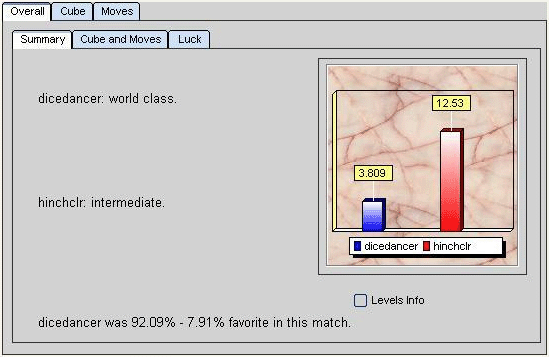|
Much has been said and written about luck vs. skill in backgammon, and I have heard many different opinions, but I want to give you not only mine, but what most of the top players in the game I have talked to believe.
Backgammon is a game of skill, and the more skill you have, the more likely you are to win. That is proven time and time again in tournaments and match results. But it is proven only in the long run.
In the short run, just about anyone can beat anyone given enough luck, and when you have dice, you have luck. I have seen rank beginners beat experts in single games. I have even seen it in 3 and 5 point matches. But the odds of a rank beginner beating an expert in an 11 point match are well under 10 to 1. But as we all know, even at 10 to 1, every ten times the beginner can get lucky and win.
There are many ways that the rules could be changed to reduce the luck factor and make backgammon closer to, say, chess, where the only luck is the luck of the draw. And many, including myself, have recommended some changes in the rules and format of the game to reduce the luck factor in major tournament play. (The Simborg Rule, which says you cannot make a point on the opening roll, has been played at many tournaments.)
But there are two major reasons we don't reduce, or even try to eliminate, the luck factor:
- A lot of the fun of the game is the unpredictability of the dice and the luck factor. The chance for someone to roll a joker, such as double 6 on the last roll to win or save a gammon, or a 1-6 from the bar to hit and win the match, is a big part of what makes the game fun and exciting. Take away that, and you'll lose a lot of players.
- If there were no luck factor, and the better player always wone (or almost always won), the better players would find it very hard to get a game for money. And the number of players in tournaments would dwindle to almost nobody—because only the very best would have a chance to win.
So the moral is, if you enjoy backgammon, you have to accept the fact that often you are going to lose games, matches, tournaments, and even money, to players who are not as skilled as you are. You simply have to take the long-term perspective.
Take a look at the picture below. I played on Gammon Empire, using my screen name of Dice Dancer, and I played a very nice person who obviously is not as good as I am. Since I run every match I play through Snowie to see how I played and look at any challenging positions, I also get to see how I played compared to my opponents.
In the 3 point match below, I played at a World Class level, meaning that in this particular match, I played at a level that any of the top players in the world would be delighted to play at.
My opponent, however, played at an intermediate level—that's just above the beginner level. And according to Snowie, given our skill levels of play, I should beat this person 93 percent of the time. So that means that 7 out of 100 times I will lose to a player of this caliber if I play at World Class level (which I often do). But I lost. And it cost me money ($20).
I know lots of people who get upset, but not me. I know that I will get to play this player again, many more times, because he won this match, and I know that if there were no luck and he never won, after a few losses we'd never see him again playing for $20.
And that's the attitude we all need to have if you are going to compete at backgammon!

|

